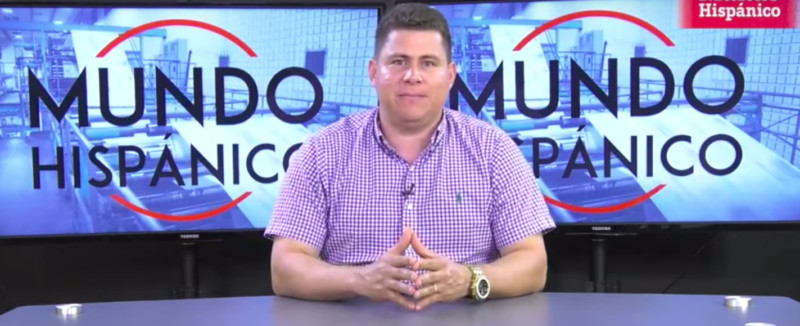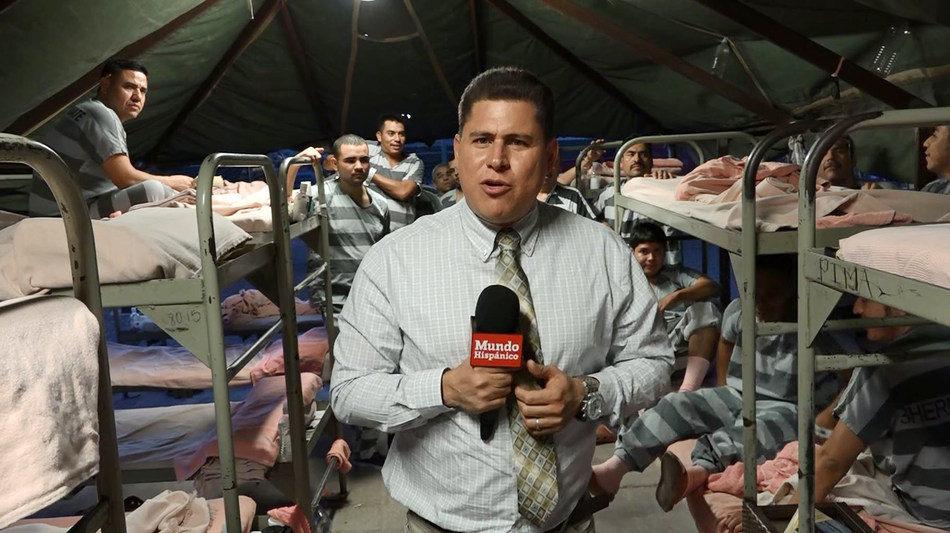Sign up for the daily CJR newsletter.
Early on the morning of Sunday, July 14, as immigration raids threatened by President Trump were set to begin across the country, many reporters in Atlanta monitored their principal source of information for raids: Mario Guevara’s Facebook feed. For years, Guevara—the senior immigration and crime reporter for Mundo Hispánico, a Spanish-language newspaper in the city—has covered an area that has the highest number of ICE community arrests in the country. In doing so, he has built trust with Atlanta’s Hispanic community: members of his audience, which includes more than 300,000 Facebook followers, message him directly to inform him of raids at their apartments or workplaces.
But that day, a Facebook video of Guevara on a 2015 ride-along with a local police officer, posted by Mundo Hispánico as part of a story about police efforts to combat drunk driving, went viral. In the video, the officer explains to Guevara his reasons for pulling over a Latino man named Oscar, who the officer says passed a breathalyzer exam. Guevara then asks whether the officer has inspected Oscar’s license. “I haven’t checked that part yet,” the officer says. When the officer does check, he learns that Oscar’s license has been suspended, and then arrests him.
The video—edited to include Spanish subtitles and commentary—was shared thousands of times in Atlanta and beyond. Many of Guevara’s former followers accused him of collaborating with authorities. “The police already told this guy that he was okay and the reporter was the one who asked for drivers’ license,” one commenter wrote on social media. “Is the reporter helping the police?” Others noted how Guevara asked for a license—a fraught action for undocumented immigrants, who usually cannot obtain one—at a time when Latinx immigrants are under increased duress and called him a “traitor,” a “snitch” for ICE, and a “family separator.” Memes comparing him to Judas (or Trump, or Scar from The Lion King) spread; readers called for Guevara’s resignation. Guevara says he lost hundreds of followers and received violent threats.
ICYMI: All the recent controversies at The New York Times that have sparked tensions within the newsroom
Guevara, who says Oscar was not deported, maintains that he never intended for his question to jeopardize anyone. He’s been on dozens of ride-alongs, he says, and officers have always asked for a license when stopping a driver, so he knew to expect it and assumed the officer had already checked or was about to. He wrote two columns and published a video for Mundo Hispánico explaining and apologizing for what happened. “Being a journalist is not easy, because we always have to report both sides of the story,” he wrote in one. “But as an immigrant, deep down, I suffer when I see injustice or when my own race is arrested and deported.”
This isn’t the first time Guevara has received blowback. His stories about crime in Spanish-speaking communities are sometimes accused of perpetuating stereotypes, and unflattering coverage of local police agencies’ cooperation with immigration authorities has bruised his relationship with sources. He’s also been the target of anti-immigrant sentiment, particularly after a New York Times article and documentary highlighted his work.
But a loss of trust could restrict Guevara’s ability to cover raids in Atlanta, which in turn limits the information that many Spanish-speaking immigrants use to make decisions about their daily lives.

Mario Guevara addresses Mundo Hispánico viewers about his appearance in the viral video. Screenshot from the July 16, 2019 video.
US LATINX NEWS MEDIA—a diverse array of outlets serving Latinx communities, including Spanish-language news, some English-language local news, or new digital startups—often “highlight more the voices of the community and less the voices of the authorities, which is exactly the opposite of what mainstream media does,” says José Luis Benavides, journalism professor at California State University, Northridge.
Much of mainstream US news media prioritizes an idea of “neutrality” that centers white, Anglo perspectives, says Graciela Mochkofsky, director of the Spanish-language journalism program at the Craig Newmark Graduate School of Journalism at CUNY; by comparison, many journalists who work in Latinx news lead with social-justice concerns. “There’s a tradition—not just in Latinx news media, but in immigrant media and Black media—of covering communities that have been so marginalized that those outlets [become] a voice of those communities,” Mochkofsky says. “It comes from a different tradition of journalism, and from a different reality of the communities they cover.”
That tradition arguably includes Guevara, a Salvadoran immigrant who narrowly avoided deportation after his request for asylum was temporarily denied in 2012. Guevara sometimes translates for readers, or puts their questions to local police and immigration authorities. He has formed close relationships with authorities, and he often leverages them. Last month, on a tip from a reader, Guevara requested an interview with a woman who had been arrested and detained by ICE. Within hours, he says, the woman had been released.
ICYMI: The immigration syllabus: 10 essential stories
Balancing the relationship with ICE and the Latinx community can be tricky, Guevara says. He communicates with immigration authorities daily—he knows many agents on a first-name basis. However, unlike his relationship with local police, Guevara has never requested to go on a ride-along with ICE because, he says, “they’ll only [show me] issues they want me to cover.” This tightrope walk is common for many journalists covering immigration: Manuel Ocaño, a Latinx news journalist based in the San Diego-Tijuana region, looks more for “human” information than official statements, which he says often amount to propaganda.
And contrary to what those outraged by the viral video might believe, Guevara says protecting undocumented sources is paramount for his work. He has filmed raids and community interactions with police, but allowed some of his sources to remain unidentified due to concerns for their immigration status—a choice his editors at Mundo support. That’s not the case with every media organization: Felipe de la Hoz, a freelance immigration reporter who formerly wrote for Documented, says he’s noticed a reluctance among some editors to allow anonymous undocumented sources in stories. “I understand why there’s a hesitation to do that, but…I don’t really see there being any benefit to using the name of somebody that’s deliberately trying to keep out of the public eye and for whom keeping out of the public eye isn’t just a career imperative—it’s an actual life-or-death thing,” he says.
In a few cases, where someone was in danger of getting hurt during raids or ride-alongs, Guevara says he’s translated between detained Spanish speakers and authorities, a departure from the fly-on-the-wall reporting tradition. Mochkofsky says these types of actions aren’t “about being an advocate”—a label that’s often used to diminish the role community and Latinx media play. Rather, she says,“it’s just, Are you putting people in danger with your reporting? Is it worth it, if so?”
Weeks after the video went viral, Guevara’s critics continue to accuse him of working with authorities. Reporting in the field, however, he has mostly found that metro Atlantans in the Spanish-speaking community still trust him, or are willing to give him a second chance.
“They believe me, or they think I maybe made a mistake, but they will not judge me for life,” he says. “Sometimes, the community sees me as a lawyer, or as Robin Hood, but that’s impossible. I’m not in that position. I’m in the middle.”
ICYMI: NPR parts ways with freelancer after Tucker Carlson targets her
Has America ever needed a media defender more than now? Help us by joining CJR today.







